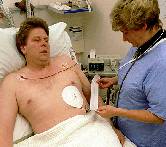- The Best Time of Day to Drink Bone Broth to Maximize Health Benefits
- 8 Ways to Increase Dopamine Naturally
- 7 Best Breads for Maintaining Stable Blood Sugar
- Gelatin vs. Collagen: Which is Best for Skin, Nails, and Joints?
- The Long-Term Effects of Daily Turmeric Supplements on Liver Health
- Could Your Grocery Store Meat Be Causing Recurring UTIs?
- Are You Making This Expensive Thermostat Error This Winter?
- Recognizing the Signs of Hypothyroidism
- 10 Strategies to Overcome Insomnia
- Could Artificial Sweeteners Be Aging the Brain Faster?
Doctors’ Groups Issue New Guidelines on Treating Common Irregular Heartbeat


Reduced use of aspirin and the addition of three new blood thinners as treatment options are among the recommendations in updated guidelines to manage a heart rhythm disorder called atrial fibrillation, which is a major risk factor for stroke.
According to the American Heart Association, atrial fibrillation involves rapid and disorganized electrical signals that cause the heart’s two upper chambers — the atria — to contract rapidly and irregularly.
Symptoms can include rapid and irregular heartbeat, heart palpitations, shortness of breath, dizziness, sweating, fatigue or chest pain. Atrial fibrillation is not a fatal condition, but it can increase a person’s risk of stroke five-fold. That’s because atrial fibrillation allows blood to pool in the atria and form clots, the AHA said.
One study published in November at the AHA’s annual meeting found that hospitalizations for atrial fibrillation nearly doubled between 1998 and 2010, topping 4.7 million cases over that time span.
The new guidelines released Friday are a joint effort by the American Heart Association, the American College of Cardiology, and the Heart Rhythm Society. The three heart groups also recommend the use of a treatment called radiofrequency ablation to treat non-valvular atrial fibrillation.
According to the AHA, radiofrequency ablation is a nonsurgical approach to treating atrial fibrillation. Doctors use a catheter to guide an electrode emitting a small amount of radiofrequency energy to a spot on the heart thought to be responsible for the erratic heartbeat. The treatment, which has a high success rate, aims to kill the cells responsible for atrial fibrillation and reverse the condition, the AHA explained.
Radiofrequency ablation should be used more often in treating atrial fibrillation, the experts recommended.
The joint guidelines are also urging the development of a more comprehensive method of calculating stroke risk for patients with atrial fibrillation.
“Most previous guidelines used a simpler risk calculator. We recommend a more detailed risk calculator that provides more information,” Dr. Craig January, chair of the guidelines writing committee, explained in a joint news release from the three organizations.
Prior guidelines called for doctors to prescribe aspirin to patients with atrial fibrillation who had a low risk of stroke. But there’s only weak data to support the notion that aspirin can cut these patients’ stroke risk, according to January, a professor of medicine in the division of cardiovascular medicine at the University of Wisconsin-Madison.
The new guidelines also recommend the use of three new blood-thinning drugs: dabigatran (Pradaxa), rivaroxaban (Xarelto), and apixaban (Eliquis). Previously, the only recommended blood thinner was Coumadin (warfarin), a drug with a long history of treating heart patients.
“Because what we say in the guideline can affect how a drug is used, we were careful to be even-handed and evidence-based in presenting new drugs,” January said. “Our goal was to provide useful, non-biased information.”
The updated guidelines will appear in the Journal of the American College of Cardiology, Circulation, and Heart Rhythm.
More information
The U.S. National Heart, Lung, and Blood Institute has more about atrial fibrillation.
Source: HealthDay
Copyright © 2026 HealthDay. All rights reserved.










